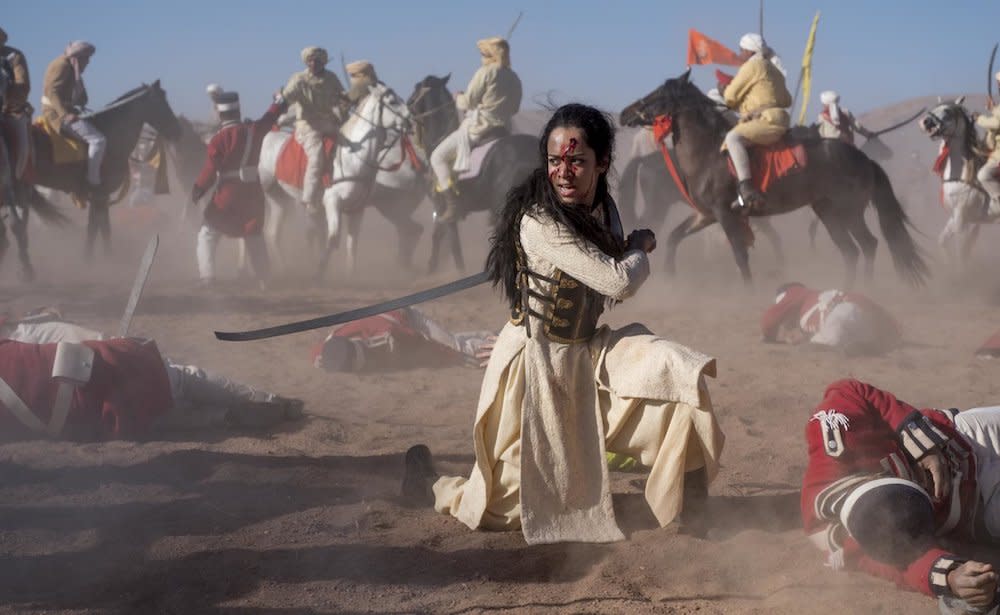Film Review: ‘The Warrior Queen of Jhansi’

Click here to read the full article.
Early in “The Warrior Queen of Jhansi,” there’s a scene that feels like something you’d find in a Bollywood take on “Wonder Woman,” during which Rani Lakshmibai, the feisty monarch of the title, takes time from serving as drill instructor for a unit of female troops to deal with the harrumphing skepticism of a male visitor. “Do you really think you can train these women to fight like men?” he asks. “No,” Lakshmibai confidently replies. Pause. “I will train them to fight better than men.”
Yes, “The Warrior Queen of Jhansi” is that kind of movie.
Specifically, it’s the kind of old school historical epic where charismatic upstarts lead idealistic revolts against tyrannical colonialists, outnumbered revolutionaries are by turns anxiously dreaded and condescendingly underestimated, and scowling louts periodically reveal the full depths of their industrial-strength nastiness by bellowing lines such as, “She will never surrender! She needs to be broken and destroyed!”
Stodgy-campy folderol of this sort can be a genuine hoot when folks on both sides of the cameras can strike the right balance between rousing spectacle and spirited scenery-chewing. Unfortunately, despite some impressively executed battle sequences and a few aggressively colorful supporting performances, “The Warrior Queen of Jhansi” is too tepidly sincere to consistently excite or amuse. What keeps it at least moderately interesting on a scene-to-scene basis is the novelty value of seeing a strong and self-confident woman, credibly portrayed by Devika Bhise, in charge of the valiant fight against the forces of unscrupulous exploiters in 1850s India.
The screenplay — credited to choreographer-tuned-director Swati Bhise, the leading lady’s mother Olivia Emden, and Devika Bhise herself — takes a fair amount of dramatic license while recalling the exploits of Rani Lakshmibai, the iconic Indian hero who refused to meekly acquiesce when the British East India Company attempted to seize her kingdom of Jhansi (with a little help from its own private army) after the death of her husband. Rather than lose face — and her kingdom — Lakshmibai organized a revolt that eventually led to the dissolution of the East India Company and the establishment of the British Raj (which, it should be noted, was not universally viewed in India as much of an improvement).
In the world according to “The Warrior Queen of Jhansi,” Major Robert Ellis (Ben Lamb), a handsome British officer, tries to serve as an honest broker between the East India Company, represented by the snarling Sir Robert Hamilton (Nathaniel Parker), and the upstart Rani (or queen) who stands in the company’s way. But Sir Robert questions the loyalties of Major Ellis, and, truth to tell, his distrust isn’t entirely misplaced: This officer is a gentleman, sympathetic to Indians in general and Lakshmibai in particular. The film stops short of indicating a full-blown romance between the pair, but it does suggest — during stretches of dialogue that point to their shared interest in, among other things, “Hamlet” — at least a mild flirtation.
Meanwhile, over in England, Queen Victoria (Jodhi May) monitors reports of rebellion in India with mounting concern. Still, she refrains from ordering the harsh retaliation counseled by her prime minister, Lord Palmerson (Derek Jacobi), and pays greater heed to the less bellicose counsel proffered by Saleem Khan (Omar Malik), her Indian advisor and confidant. (The latter character evidently is a fictional construct based on the real-life Mohammed Abdul Karim, who didn’t actually start advising Queen Victoria until nearly 30 years after the events dramatized here — and didn’t get his own movie glory until “Victoria and Abdul” was released in 2017.)
“The Warrior Queen of Jhansi” might have done better to spend even more time comparing and contrasting the ways Queen Victoria and Rani Lakshmibai wielded power and plotted strategy despite second-guessing by males in their orbit. On the other hand, the images of Lakshmibai wielding a terrible swift sword in combat could conceivably be more effective in terms of consciousness raising.
Sign up for Variety’s Newsletter. For the latest news, follow us on Facebook, Twitter, and Instagram.

